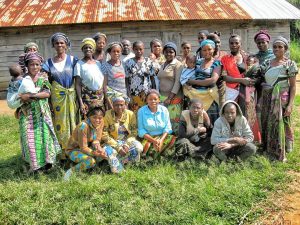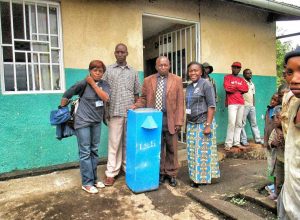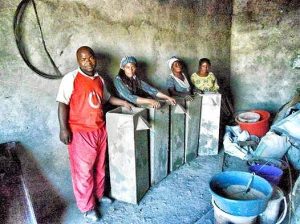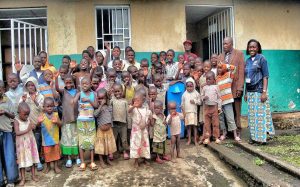Another Huge Water Filter Training for the Democratic Republic of Congo!
This project has been completed. Read the #Conclusion Report below.
Location
Nyiragongo, Democratic Republic of Congo
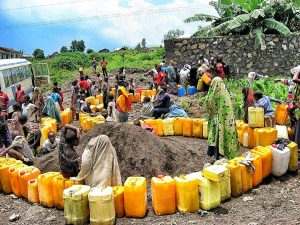 Muja group; including the Territory of Nyiragongo and the Territory of Masisi. The training will take place in the city of Rubaya in Masisi region nearby. Both territories are in North Kivu Province in the Democratic Republic of Congo, and the women will come from 200+ villages around Nyiragongo.
Muja group; including the Territory of Nyiragongo and the Territory of Masisi. The training will take place in the city of Rubaya in Masisi region nearby. Both territories are in North Kivu Province in the Democratic Republic of Congo, and the women will come from 200+ villages around Nyiragongo.
Community Description
The territory of Nyiragongo and Masisi are entities of the North Kivu province. Nyiragongo is not far from the city of Goma, and has a volcanic environment. They are poor, in part, because of a government that has completely ignored the needs of the population.
The land is fertile, but the water sources are few. The population waits for the rainy season to dig shallow holes and collect rainwater. Those who have the means walk 10 km or more to the city of Goma or Rubaya to get water. Sadly, the area is surrounded by mines.
The few water resources that do exist are heavily used in the extraction of minerals. Communities use dirty water coming from the quarries. The presence of rare earth minerals like coltan and beryllium has led to decades of conflict. While some foreign companies have grown rich on these resources, having a large amount of the most valuable elements on Earth hasn’t benefited the local population… but on the contrary has made their lives a living hell on occasion, as various militias, armies and mercenary groups come through the area and ravage the land, kill people, rape the women and pillage the resources.
Now, at this point, the hundreds of villages in the area are nearly depleted of adult men and are composed almost entirely of women, children and the elderly. The men have either fled, been conscripted into government or rebel armies, or been killed.
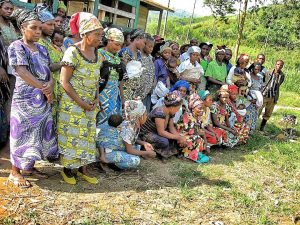 The women of the region, against all odds, have banded together to form collective groups that are working to raise up this area, and have been very successful in providing for their own needs… serving the functions that governments usually serve in most countries. They have banded together in what are known as MUSOs (Mutual Use Sustainability Organizations) and created one of the largest and most successful self-help communities going in the world now. They have built health clinics, hired doctors and surgeons, kept up vital infrastructure, and now want to deal with their water issues!
The women of the region, against all odds, have banded together to form collective groups that are working to raise up this area, and have been very successful in providing for their own needs… serving the functions that governments usually serve in most countries. They have banded together in what are known as MUSOs (Mutual Use Sustainability Organizations) and created one of the largest and most successful self-help communities going in the world now. They have built health clinics, hired doctors and surgeons, kept up vital infrastructure, and now want to deal with their water issues!
This training project is being done with the Peace Center for Healing and the Reconstruction of Community Foundations (CPGRBC is the French acronym). This Congolese NGO is trying to help the people of the region in a number of ways. The CPGRBC today works in the field of rebuilding communities in Masisi, Walikale, and Nyiragongo that have been long torn by armed and ethnic conflicts. It has implemented more than 120 peace committees, which are local structures of the peace that work in their communities towards reconciliation and solidarity. It has established 50 groups of women working in micro-credit. Also, the CPGRBC is working on a trauma healing program in the fight against neglected tropical diseases by assisting vulnerable people in Nyiragongo to eradicate chiggers and waterborne diseases.
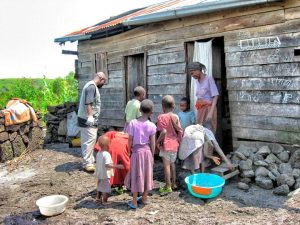 Problem Addressed
Problem Addressed
The lack of water in this area around the volcanoes, and the pollution that has engulfed the rivers used since ancient times, creates the current situation that the population here lives in water scarcity and is suffering from many different kinds of diseases. A major problem in the area is waterborne diseases due to water scarcity and the consumption of unsafe water. Supporting these communities in their effort to drink clean water would help improve their health tremendously.
CPGRBC approached our friends at Friendly Water with the desire to fight against diseases related to the consumption of unsafe water by providing opportunities for communities to obtain, make and distribute bio-sand filters. Water Charity was thrilled to be able to lend aid for this worthy goal and decided to fund the entire effort.
Project Description
This project will consist of a series of a 6-day training for a couple of hundred women in the manufacture, use, and upkeep of cement bio-sand water filters. The women will receive molds, tools, and materials to make their first filters and will be trained on ways to turn all of this into small businesses for themselves, their MUSOs and their communities. Manuals and printed training materials will be given out in Swahili, English, French, Kinyarwanda, and a light lunch and tea for all participants will be provided every day.
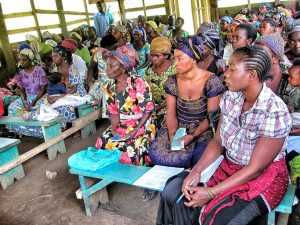
The training will be conducted by Aristotle Lubao Mbairwe (Trainer with FW & CPGRBC), Zawadi Nikuze (CPGRBC leader), and Zawadi Mburano (also of CPGRBC). The training is in concert with Dr. Kambale Musubao (FW medical officer) and MUSO organizers. CPGRBC and the MUSOs themselves are even coming up with a decent portion of the costs for this training.
The women who receive this training will go home with a functioning filter, but will also have the molds and designs to make as many as they can. They will be instructed in techniques to sell filters they make, sell clean water that they generate with their filters, and to proliferate the technology to others.
The profits made from some of the sales will go towards procuring more materials and molds. In this way, the projects are infinitely sustainable, generate income for these women, and can potentially reach and assist all the women in these villages via the MUSO system and the help of the CPGRBC. FW & WC are proud to be able to create such a large and beneficial “ripple effect” with this project.
All residents of the 200+ villages in the region will benefit from this work. In time, as many as 300,000 people could profit, as clean water, water filters, and the knowledge of how to make more disperse in these MUSO communities that are dedicated to sharing and mutual solidarity.
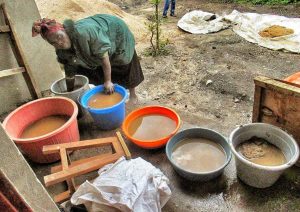 Volunteer Directing Project
Volunteer Directing ProjectZawadi Nikuze is directing this project on the ground, and management is under the direction of David Albert, Board Chairman of Friendly Water for the World, with Water Charity overseeing. See below for Zawadi’s story.
Monitoring and Maintenance
CPGRBC and FW representatives will monitor the project and forward its objectives, but its maintenance will fall mainly to the women themselves and the MUSOs they belong to. Given how self-motivated these remarkable women are, and have proven themselves to be in the face of all manner of adversity, we have no doubt that they will bring this raw strength and ability to bear on solving their water quality issues, and eradicate the scourge of waterborne illnesses from their lives entirely.
Comments
This project is part of our Training and Support Initiative and is a sister project to our Minova Water Filter Training Project.
In the past, the ongoing war in Goma prevented training activities, and the general situation in the DRC kept WC from operating there due to our model of helping people efficiently as possible and never asking our volunteers to put themselves in harm’s way. We are extremely happy now, however, to be able to render aid in such a needy area, and in such a sustainable way.
History and the present:
• In late 2007-early 2008, a new phase of the Congolese war resulted in hundreds of thousands of people streaming out of the countryside toward the city of Goma.
• Without any preparation or permission, they set up their own makeshift refugee camp southwest of the city. It is said to have grown quickly to almost 200,000 people.
• Some international organizations attempted to provide material assistance there.
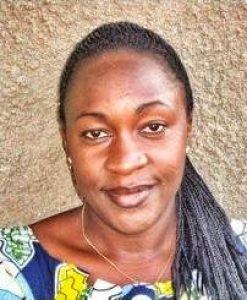 • A small group of Quakers led by Zawadi Nikuze, a Quaker social worker, worked in the camp. The main work that the Quakers were involved in was trauma healing and reconciliation efforts, especially trying to prevent conflicts within the camp from erupting into violence.
• A small group of Quakers led by Zawadi Nikuze, a Quaker social worker, worked in the camp. The main work that the Quakers were involved in was trauma healing and reconciliation efforts, especially trying to prevent conflicts within the camp from erupting into violence.
• In 2009, the government decided they did not want a refugee camp there and sent troops to oust people from the camp. They sent tens of thousands of people out into the countryside, to “return to their homes” (but most of their homes had been destroyed). Thousands are said to have died of starvation, exposure, and ongoing military conflict.
• Some 200 women, many with young children, refused to go, even at gunpoint. These women were survivors of rape, and had been rejected by their families and could thus not even join the diaspora.
• Zawadi began working with these women, found primitive places for them to stay in Goma, and provided them with minimum support.
• Zawadi’s organization became one of “participatory development” alongside its trauma healing and peacebuilding activities. It is non-sectarian.
• Zawadi came on three speaking tours to the U.S.
• Zawadi was trained by Friendly Water in Newberg, Oregon in October 2013. (She was 8 months pregnant at the time.)
• In March 2014, Friendly Water for the World held training in Goma, Congo, which spawned three new groups: one associated with Dr. Kambale Musubao and the MUSO groups; one associated with Zawadi and CPGRBC; and God in Us-Africa, in Gisenyi, Rwanda. All three became hugely successful.
• The women rape survivor affiliated with CPGRBC built and installed the first Filters in the 26 Goma orphanage, and later formed a major part of the program that eliminated cholera in all of them.
• CPGRBC has expanded to encompass some 120 local peace committees and 50 groups of women. Most are working on trauma healing and reconciliation activities.
• Later, it is hoped that members of CPGRBC will receive training in the fabrication of rainwater catchment systems/Ferro-cement tanks so that the open cisterns will no longer be able to spread disease. WC is happy to support them in this.
This project has been fully funded by a donor who wishes to remain anonymous. If you would like to see us expand, scale-up and do more projects like this one, use the DONATE button below, and your donation will go to more training projects like this one.
Conclusion Report: Peace Center for Healing and Reconstruction of Community Foundations (CPGRBC) – Nyiragongo Project
This training project went off without a hitch and was another unmitigated success in our Training & Support Initiative. Many people in the region will benefit from this technology being propagated. Not only are the 4 communities and the CPGRBC making and selling BioSand filters, but they are also selling water, purchasing more tools, and teaching more people to do the same. Waterborne illness has already diminished since the project was completed earlier this year.
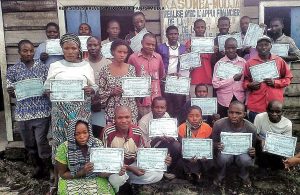
Trainees with their certificates!
Background to CPGRBC and Water: CPGRBC was originally formed in 2009 by Zawadi Nikuze to provide healing and services to some 200 refugee women (and their children) who had been raped in the ongoing conflict in northeastern Congo. The project has grown steadily since. In 2013, when 8 months pregnant, Zawadi Nikuze was trained by Friendly Water for the World. In turn, in March 2014, she helped trained rape survivors from her group in Goma, who have gone on to manage a sustainable BioSand Filter project. They provided the first Filters to the 26 orphanages in Goma to help overcome the cholera epidemic there.
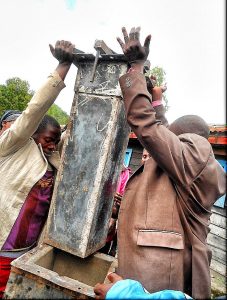
The Project: Friendly Water for the World trainers conducted a series of five-day training for four communities in Nyiragongo and Masisi in the fabrication of BioSand Water Filters and in community sanitation and hygiene. The communities themselves contributed $6,250 in goods and services. The four communities – Mudjua, Mutayo, Rusayo, and Rubaya – each received two steel molds and a toolkit, needed for BioSand Filter construction. Some 100 people were trained; 48 of them women.
As of February 1st, 2017 (60 days after the end of the last training), 92 Filters had been built (87 installed). Since then, these numbers have grown exponentially.
Among the results:
– People have a better understanding of the BioSand Filter, and hygiene and sanitation. They also have better health and improved lifestyle.
– The groups have created a solidarity fund to be able to help other members of the community who have no resources have access to clean drinking water through the BioSand Filters.
– The groups have become volunteers and advocates for clean water and awareness of the waterborne diseases in their respective communities.
– The groups are already taking steps to ensure sustainability:
* They have formed sustainable BioSand Filter, hygiene and sanitation philanthropies in their communities;
* They are saving a part of the proceeds from BioSand Filter sales to purchase more materials to make more filters.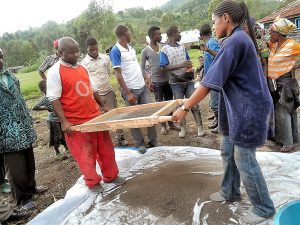
* They have formed follow-up committees.
In the longer run, the participants expect this project should give rise to other projects such as:
• Microcredit
• Vegetable growing
• Child protection
• Formation of solidarity groups.
All in all a very worthy project. As we receive more reports from the field, we will continue to post them here. So check back, follow our RSS feed, follow us on Twitter, or follow us on Facebook! (links at bottom of this & every page)
Remember that this was the water source they used before:

